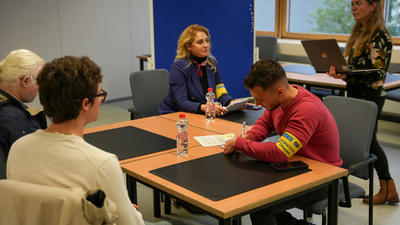-
Our work
-
Fields of work
- Arms control
- Border management
- Combating trafficking in human beings
- Conflict prevention and resolution
- Countering terrorism
- Cyber/ICT Security
- Democratization
- Economic activities
- Education
- Elections
- Environmental activities
- Gender equality
- Good governance
- Human rights
- Media freedom and development
- Migration
- National minority issues
- Policing
- Reform and co-operation in the security sector
- Roma and Sinti
- Rule of law
- Tolerance and non-discrimination
- Youth
- Field operations
- Projects
-
Meetings and conferences
- Summit meetings
- Review Conferences
- Ministerial Council meetings
- Plenary meetings of the Permanent Council
- Plenary Meetings of the Forum for Security Co-operation
- Security Review Conferences
- Annual Implementation Assessment Meetings
- Economic and Environmental Forum
- Economic and Environmental Dimension Implementation Meetings
- Human rights meetings
- Media conferences
- Cyber/ICT security conferences
- Conference of the Alliance against Trafficking in Persons
- Gender equality conferences
- Annual OSCE Mediterranean conferences
- Annual OSCE Asian conferences
- Partnerships
-
Fields of work
-
Countries
- All
-
Participating States
- Albania
- Andorra
- Armenia
- Austria
- Azerbaijan
- Belgium
- Belarus
- Bosnia and Herzegovina
- Bulgaria
- Canada
- Croatia
- Cyprus
- Czechia
- Denmark
- Estonia
- Finland
- France
- Georgia
- Germany
- Greece
- Holy See
- Hungary
- Iceland
- Ireland
- Italy
- Kazakhstan
- Kyrgyzstan
- Latvia
- Liechtenstein
- Lithuania
- Luxembourg
- Malta
- Moldova
- Monaco
- Mongolia
- Montenegro
- The Netherlands
- North Macedonia
- Norway
- Poland
- Portugal
- Romania
- Russian Federation
- San Marino
- Serbia
- Slovakia
- Slovenia
- Spain
- Sweden
- Switzerland – OSCE Chairpersonship 2026
- Tajikistan
- Türkiye
- Turkmenistan
- Ukraine
- United Kingdom
- United States of America
- Uzbekistan
- Asian Partners for Co-operation
- Mediterranean Partners for Co-operation
-
Structures and institutions
- Chairpersonship
-
Secretariat
- Secretary General
- Office of the Secretary General
- Conflict Prevention Centre
- Transnational Threats Department
- Office of the Special Representative and Co-ordinator for Combating Trafficking in Human Beings
- Office of the Co-ordinator of OSCE Economic and Environmental Activities
- Gender Issues Programme
- Opportunities for Youth
- Department of Human Resources
- Department of Management and Finance
- Office of Internal Oversight
- Documentation Centre in Prague
- Institutions
-
Field operations
- Presence in Albania
- Centre in Ashgabat
- Programme Office in Astana
- Programme Office in Bishkek
- Mission to Bosnia and Herzegovina
- Programme Office in Dushanbe
- Mission in Kosovo
- Mission to Moldova
- Mission to Montenegro
- Mission to Serbia
- Mission to Skopje
- Project Co-ordinator in Uzbekistan
- Closed field activities
- Parliamentary Assembly
- Court of Conciliation and Arbitration
- Organizational structure
- About us

Story
Economic impact of trafficking in human beings
- Date:
- Source:
- OSCE Secretariat
- Fields of work:
- Combating trafficking in human beings, Economic activities
Trafficking - a definition
According to the UN Palermo Protocol, trafficking in human beings means the "recruitment, transportation, transfer, harbouring or receipt of persons, by means of the threat or use of force or other forms of coercion, of abduction, of fraud, of deception, of the abuse of power or of a position of vulnerability or of the giving or receiving of payments or benefits to achieve the consent of a person having control over another person, for the purpose of exploitation". A major difference between smuggling of persons and trafficking in human beings is that the latter includes an element of coercion, deception and exploitation.
Trafficking and the OSCE
Thousands of people - most of them women and children from less privileged countries - are trafficked each year, generating huge profits for organized criminal networks. Social inequalities, corruption and a demand for various forms of cheap labour in countries of destination facilitate the operation of such networks and devastate national economies. For these reasons, trafficking in human beings challenges all dimensions of OSCE's work: human, politico-military and economic.
Recognizing the negative and destabilizing impact of trafficking throughout the OSCE region, foreign ministers from the 55 OSCE participating States adopted the "Declaration on Trafficking in Human Beings" at the Porto Ministerial Council in December 2002, and recommended that the Office of the Co-ordinator of OSCE Economic and Environmental Activities play an increased role in addressing all economic aspects of trafficking.
Aim of the seminar
Participants to the seminar will focus on the root causes of trafficking from an economic perspective, and contribute to the formulation of a policy agenda. They will also discuss the impact of trafficking in human beings on national and international economies and explore possibilities for future co-operation.
The seminar aims at complementing the work of the OSCE Office for Democratic Institutions and Human Rights, the Stability Pact for South Eastern Europe Task Force on Trafficking in Human Beings, the OSCE Informal Group on Equal Opportunities for Men and Women and Anti-Trafficking, as well as other international organizations and NGOs.
OSCE Impact
Discover more stories about how the OSCE improves lives.

Story
How one training sparked Iceland’s largest anti-trafficking operation
3 December 2025
Office of the Special Representative and Co-ordinator for Combating Trafficking in Human Beings

Story
Combating Human Trafficking begins in the workplace
14 September 2022
Office of the Special Representative and Co-ordinator for Combating Trafficking in Human Beings